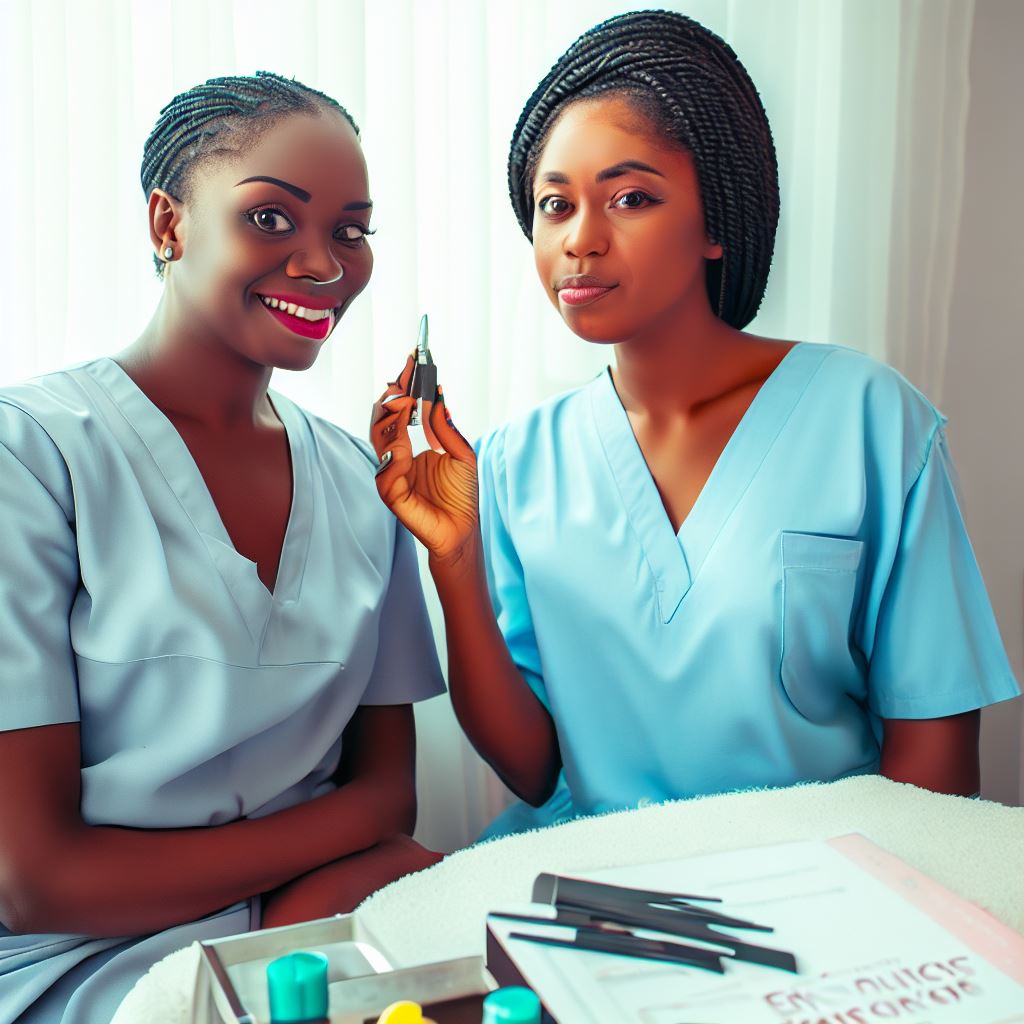Introduction
In the beauty therapy industry, customer relations play a vital role in success.
As a beauty therapist in Nigeria, building trust with clients is crucial.
Developing a strong rapport and establishing credibility are essential to thrive in this industry.
Providing excellent customer service and personalized experiences will help gain customer loyalty.
Creating a welcoming and comfortable environment is key to building trust with clients. Effective communication is vital to understand clients’ needs and preferences.
Building long-lasting relationships can lead to repeat business and positive word-of-mouth referrals.
Demonstrating expertise and staying updated with industry trends and techniques will build clients’ trust.
Addressing client concerns promptly and professionally will enhance customer relations.
Offering personalized skincare and beauty treatment solutions tailored to individual needs will strengthen trust.
Adhering to high standards of hygiene and safety will ensure client confidence. Being transparent about products used and pricing will establish trust and credibility.
Taking feedback and continuously improving services will strengthen customer relations.
Maintaining a positive attitude and being passionate about the work can create a lasting impression on clients.
Emphasizing the importance of a client’s satisfaction will enhance trust and loyalty.
Customer relations in the beauty therapy industry are invaluable and can significantly impact the success of a beauty therapist in Nigeria.
Understanding the Nigerian beauty therapy industry:
In order to build trust as a beauty therapist in Nigeria, it’s important to navigate these challenges effectively.
Building trust with Nigerian customers
1. Provide exceptional service and results
Deliver personalized, high-quality treatments that meet or exceed customer expectations. Aim for excellence in both technical skills and customer service.
2. Use natural and culturally appropriate products
Recognize the cultural preferences of Nigerian customers and offer treatments that utilize natural and locally sourced ingredients.
This demonstrates respect for their values and enhances trust.
3. Maintain a clean and hygienic environment
Ensure your salon or spa is clean, organized, and equipped with proper sanitation measures.
This is crucial for the health and safety of customers and helps build trust.
4. Continuously upgrade skills and knowledge
Stay up-to-date with the latest techniques and trends in the beauty therapy industry.
Attend workshops, seminars, and training programs to enhance your skills and build credibility.
5. Offer competitive pricing and value-added services
While maintaining reasonable pricing, provide value-added services such as personalized consultations, skincare advice, or loyalty programs.
This demonstrates your commitment to customer satisfaction.
6. Enhance customer experience
Create a warm and welcoming atmosphere for your customers.
Offer refreshments, comfortable seating, and a pleasant environment to make their visit enjoyable and memorable.
7. Encourage customer feedback and address concerns promptly
Regularly seek feedback from your customers and address any concerns or complaints promptly.
This shows that you value their opinions and are committed to providing excellent service.
8. Build strong relationships
Invest time in building relationships with your customers. Remember their preferences, celebrate special occasions, and maintain regular communication to foster loyalty and trust.
Building trust as a beauty therapist in Nigeria requires a combination of skill, knowledge, and cultural sensitivity.
By understanding the industry, meeting customer expectations, and consistently delivering exceptional service, you can establish a loyal customer base and thrive in this competitive market.
Read: Challenges and Rewards: Beauty Therapy Profession in Nigeria
The Significance of Trust in Customer Relations
Building trust is key for success in the beauty therapy industry. It impacts customer loyalty and repeat business.
Trust forms the foundation for long-term relationships with clients, ensuring their continued patronage and support.
There are several benefits to building trust with customers in the beauty therapy industry:
- Gaining Customer Loyalty: When clients trust their beauty therapist, they are more likely to become loyal customers.
- Repeat Business: Trust leads to repeat business as satisfied customers are more likely to return for further treatments.
- Better Communication: Trust allows for open and honest communication, enabling therapists to understand clients’ needs and expectations.
- Positive Word-of-Mouth: Satisfied customers who trust their therapists are more likely to recommend their services to others.
- Enhanced Reputation: A strong foundation of trust can help build a positive reputation for the beauty therapist.
- Increased Clientele: Building trust with existing customers can attract new clients through positive reviews and recommendations.
Trust in customer relations is particularly crucial in the beauty therapy industry due to its intimate nature.
Beauty therapists often work closely with clients, requiring a high level of trust to create a comfortable and safe environment.
Establishing trust involves several factors
- Consistency: Being consistent in delivering quality service and maintaining professional standards.
- Reliability: Fulfilling promises and commitments made to customers, such as punctuality and delivering desired results.
- Transparency: Being open and honest with clients about products, procedures, and potential outcomes.
- Listening and Understanding: Taking the time to actively listen and understand clients’ concerns and preferences.
- Empathy: Showing empathy towards clients by addressing their individual needs and providing personalized solutions.
- Respect: Respecting clients’ privacy, cultural backgrounds, and personal choices during treatments.
To build trust, beauty therapists should prioritize customer satisfaction and go the extra mile in their service delivery.
They can also build trust by providing a clean and hygienic environment, using high-quality products, and adhering to professional ethics.
Regularly seeking customer feedback and addressing any concerns promptly are important trust-building techniques.
It is crucial for beauty therapists to understand that trust takes time to develop but can be easily broken.
Consistency in delivering excellent service and consistently demonstrating professionalism is key to maintaining trust.
In fact, trust plays a vital role in customer relations within the beauty therapy industry.
Building trust leads to customer loyalty, repeat business, positive word-of-mouth, and an enhanced reputation.
By prioritizing consistency, reliability, transparency, and empathy, beauty therapists can establish long-lasting relationships with their clients.
Remember, trust is earned and should always be nurtured to ensure continued success in this industry.
Read: Top Cities for Beauty Therapists in Nigeria: Where to Work

Building trust with Nigerian customers
When it comes to being a beauty therapist in Nigeria, building trust with customers is essential.
Trust is the foundation of any successful business, and it is even more crucial in the beauty industry.
Here are some effective strategies for establishing trust with Nigerian customers:
Establishing credibility through professional certifications and qualifications
- Invest in obtaining relevant certifications and qualifications to showcase your expertise.
- Display your certifications in a visible area of your salon or spa.
- Communicate the significance of your certifications to customers, emphasizing your commitment to their well-being.
- Attend workshops and conferences to keep your skills up-to-date and gain the trust of customers.
Creating a welcoming and comfortable environment for clients
- Ensure that your salon or spa is clean, organized, and visually appealing to make customers feel relaxed and comfortable.
- Train your staff to be polite, friendly, and professional at all times, providing excellent customer service.
- Offer complimentary amenities like beverages, comfortable seating, and soothing music to enhance the overall experience.
- Personalize your services to meet the unique needs and preferences of each customer, making them feel valued and cared for.
Listening actively and empathizing with customers’ concerns
- Show genuine interest in understanding your customers’ desires, concerns, and skin or hair-related issues.
- Practice active listening by maintaining eye contact, nodding, and providing verbal cues to show that you are attentive.
- Empathize with their concerns and demonstrate empathy by offering relevant solutions or suggestions.
- Encourage open and honest communication, creating a safe space for customers to share their feedback and concerns.
Honesty and transparency in services, pricing, and products
- Be transparent about the services you offer, providing detailed explanations of the procedures, benefits, and potential risks.
- Ensure that your pricing is fair, competitive, and transparent, avoiding hidden costs or surprise charges.
- Use high-quality products and inform customers about the ingredients, benefits, and potential side effects.
- Do not make false promises or guarantees, as it will harm your reputation and erode trust.
Building trust as a beauty therapist in Nigeria requires dedication, consistency, and a customer-centric approach.
By establishing credibility, creating a welcoming environment, actively listening to customers, and promoting honesty and transparency, you can forge strong and long-lasting relationships with your Nigerian clientele.
Trust is the key to success in the beauty industry, and once you gain it, your business will thrive.
Read: Networking and Associations for Beauty Therapists in Nigeria
Effective communication techniques
- Developing good communication skills as a beauty therapist is essential for building trust with clients.
- Active listening and understanding clients’ needs and preferences is key to providing personalized and satisfactory services.
- Clear and concise explanations of treatments, procedures, and products help clients make informed decisions.
- Communicating effectively through non-verbal cues and body language creates a comfortable and welcoming environment.
Developing good communication skills as a beauty therapist
Being a successful beauty therapist goes beyond technical expertise and requires the ability to communicate effectively with clients.
Developing good communication skills ensures that clients feel comfortable, understood, and valued.
Active listening is a fundamental aspect of effective communication.
By listening attentively and sincerely, beauty therapists can gain valuable insights into clients’ goals, concerns, and preferences.
This not only demonstrates respect but also helps in personalizing the treatments and services provided.
Moreover, clear and concise explanations are essential for building trust and transparency.
When clients understand the details of treatments, procedures, and products, they can make informed decisions and feel confident about the services they receive.
Non-verbal cues and body language play a significant role in establishing a positive rapport with clients.
These include maintaining eye contact, using appropriate facial expressions, and adopting an open and welcoming posture.
A warm smile and a friendly demeanor can make clients feel at ease and enhance their overall experience.
Active listening and understanding clients’ needs and preferences
Active listening is a skill that every beauty therapist should strive to master. It involves paying full attention to what clients are saying, both verbally and non-verbally.
By doing so, beauty therapists can better understand clients’ needs, desires, and concerns.
During consultations, it is crucial to give clients the opportunity to express their expectations and desires openly.
Beauty therapists should create a safe and non-judgmental environment where clients feel comfortable sharing their preferences and concerns without hesitation.
Additionally, understanding clients’ non-verbal cues is equally important.
Observing their body language, facial expressions, and tone of voice can provide valuable insights into their emotional state and level of satisfaction.
This information can guide beauty therapists in customizing their services to meet clients’ specific needs.
Clear and concise explanations of treatments, procedures, and products
When it comes to beauty treatments and procedures, clients appreciate clear and concise explanations.
Beauty therapists should be able to communicate the process, expected outcomes, and any potential risks or side effects in a manner that clients can easily comprehend.
Using simplified language and avoiding industry jargon is essential to ensure effective communication.
Clients should feel empowered to ask questions and seek clarification without feeling overwhelmed or intimidated.
Additionally, beauty therapists should take the time to educate clients about the products they use or recommend.
Explaining the benefits, ingredients, and proper usage can instill confidence and trust in the products and the therapist’s expertise.
Communicating effectively through non-verbal cues and body language
Non-verbal cues and body language can convey a wealth of information without uttering a single word.
As a beauty therapist, it is important to be mindful of the messages these cues send and to use them deliberately to create a positive interaction.
Maintaining eye contact shows attentiveness and interest in clients’ concerns. It demonstrates that their words are being valued and given full attention.
Using appropriate facial expressions conveys empathy and understanding. A smile can instantly put clients at ease, while a concerned expression can show empathy towards any discomfort they may be experiencing.
Body language, such as an open posture and relaxed gestures, creates a welcoming and approachable atmosphere.
Clients are more likely to trust and feel comfortable around beauty therapists who exhibit such non-verbal cues.
In short, effective communication is vital for building trust as a beauty therapist in Nigeria.
By developing good communication skills, actively listening, providing clear explanations, and using non-verbal cues, beauty therapists can create a positive and personalized experience for their clients.
This not only ensures client satisfaction but also fosters long-term relationships and loyalty.
Providing exceptional customer service
- Going the extra mile to exceed customer expectations.
- Addressing and resolving customer complaints promptly and professionally.
- Customizing services to meet individual customer needs.
- Building genuine relationships with customers through personalized attention.
In the vibrant world of beauty therapy in Nigeria, trust is the cornerstone of success.
Exceptional customer service is more than just great treatments; it’s a commitment to exceeding expectations.
To provide outstanding service, address complaints promptly and professionally.
Listening, empathizing, and resolving issues demonstrate your dedication to customer satisfaction.
Customization is key. Each customer is unique with specific preferences. Tailoring your services to meet individual needs shows genuine care and a willingness to surpass expectations.
Establishing genuine relationships is vital. Personalized attention, remembering names, preferences, and previous treatments, fosters trust and loyalty.
Maintain professionalism, always be punctual, well-groomed, and knowledgeable. Transparency and honesty are paramount. Being forthright about treatments and outcomes builds trust.
Seek and value customer feedback. Actively striving for improvement through feedback shows your commitment to their experiences.
In general, in Nigeria, exceptional customer service is your passport to becoming a trusted and reliable beauty therapist in your community.
Read: Beauty Therapy Trends in Nigeria: Stay Ahead of the Curve
Building an online presence and leveraging social media
Power of social media in building trust and reputation
- The power of social media in building trust and reputation cannot be underestimated.
- Engaging with customers online through social media platforms allows for direct and instant communication.
- Regularly updating social media profiles and sharing relevant content helps to build credibility.
- Using social media to showcase achievements and testimonials from satisfied customers can enhance trust.
Creating a professional website and engaging with customers online:
- A professional website is essential for beauty therapists to showcase their services and expertise.
- The website should be user-friendly, visually appealing, and provide relevant information about the therapist and their services.
- Engaging with customers online can be done through interactive features such as live chat or appointment booking forms.
- Responding promptly to customer inquiries and providing helpful information can foster trust and loyalty.
Responding to customer reviews and comments constructively:
- It is crucial to monitor online reviews and comments to address any concerns or negative feedback.
- Responding to reviews in a constructive and professional manner shows that the therapist values customer feedback.
- Addressing any issues raised in reviews and taking appropriate action can demonstrate a commitment to customer satisfaction.
- Taking the time to thank customers for positive reviews and testimonials can further enhance trust and loyalty.
Sharing useful beauty tips and industry insights to establish credibility:
- Regularly sharing beauty tips and industry insights on social media and websites can position the therapist as an expert in their field.
- Providing valuable information can help to build trust and credibility with customers.
- Offering tips and advice on skincare, makeup, and hair care can showcase the therapist’s knowledge and skills.
- Engaging in conversations with customers and answering their beauty-related questions can further establish trust and loyalty.
In essence, building trust as a beauty therapist in Nigeria requires a strong online presence and effective use of social media.
Creating a professional website, engaging with customers online, and responding to reviews constructively are essential strategies.
Additionally, sharing useful beauty tips and insights will establish credibility and position the therapist as an industry expert.
By implementing these strategies, beauty therapists in Nigeria can build trust, enhance their reputation, and attract loyal customers.
Conclusion
Building trust as a beauty therapist in Nigeria is of utmost importance.
Trust has a significant impact on customer satisfaction and overall business success.
It is crucial to implement strategies that enhance customer relations and trust-building efforts in the beauty therapy industry in Nigeria.




